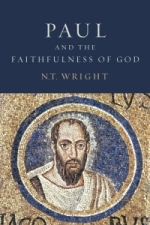New rare footage of Bobby Fischer analysing!
“Pauline studies have undergone major changes in recent times. Which new research topics and methods would you especially highlight? Would you, moreover, agree to speak of a paradigm shift?”
So a number of scholars were asked, and many responded by pointing to a “rediscovery” of “Paul’s Jewishness” (it’s a great webpage to read, by the way, including some very informative responses. “Click and read” as God said to Augustine)
However, although this “paradigm shift” has helped sharpen a methodology of analysis which, thanks also to new resources, has been somewhat helpful sometimes, I am sceptical that it is any more than that.
Here are a few matters which I think may help genuine paradigm shifts in coming decades (though time has a way of proving such predictions woefully wrong, so we shall see!)
I could go and on mention a vigorous appreciation for the contingent, a consistent rejection of the etymological myth (Barr) etc. and I am also assuming that a reading of Paul in terms of his second Temple “encyclopaedia” (to use Eco’s language) is indeed essential, and rightly highlighted by many of the above webpage’s respondents. But if that is all there is to “major changes in recent times”, then heaven help us.

Second, BIG thanks to Eerdmans for a copy of Dunn’s The Oral Gospel Tradition! I have been keen to get my hands on this collection of Dunn’s essays ever since I read about it. The Table of Contents has me salivating!
Tom Thatcher blurbs:
“This book helpfully brings together a number of significant essays by a leading voice in the study of Jesus, the Gospels, and early Christian tradition. As indicated by the new and very helpful introduction, the collection not only surveys Dunn's own voluminous work on the topic but also serves, in many respects, as a recent history of research, tracing trends in the evolution of study on the media history of early Christianity”

Matthew Montonini alerts us to the following: Wright’s hugely anticipated Paul and the Faithfulness of God Augsburg Fortress webpage has been updated with downloadable samples:
Chapter 1 (74 pages to keep you busy)
Bruce Longenecker’s endorsement made me smile: “Endorsing this book would be an exercise in superfluity”!
Following on from my post tabulating revival, here is the talk I gave at the HTB week away, Focus 2013.
Should we live for ‘revival’ and is this the ‘generation’ that will see it? http://www.htb.org.uk/media/theology-life-revival
The PowerPoint for the talk can be downloaded here.
Okay, all, which back-cover text would you advise I use, or an alternative? It’s for the forthcoming Beyond Old and New Perspectives on Paul, ed. by me. Needless to say, I’m excited by this book!
Douglas Campbell’s ground-breaking, brilliant and controversial work has left many New Testament scholars and theologians reeling. Whether you are interested in justification, debates concerning “old” and “new” perspectives, Paul’s faith-language, interpretation of Romans, Paul’s Christology, ethically responsible reading, paradigms, or theological exegesis, Campbell’s work is essential reading. He tackle all of these issues, and many others besides, in fresh and exciting ways, all the while setting unique and arguably devastating challenges to large swaths of contemporary Pauline scholarship. But far from simply eccentric, Campbell’s work represents the highest level of academic rigour in such a way that also deeply resonates with the Church’s best intuitions. So his arguments demand the serious engagement of both the scholarly and ecclesial communities. This book seeks to facilitate this engagement in a unique way. Not only are chapters devoted to critiquing his proposals, others to summarising them, but Campbell also offers his responses, noting where and how his mind has developed as a result. By doing this – and whether you have begun to read Campbell or not – you the reader are drawn into these many vitally important and exciting conversations. This book therefore sits at the cutting edge of exciting developments in Pauline studies.Shorter:
New Testament studies have been shaken. Douglas Campbell’s ground-breaking publications have left many scholars reeling. Familiar problems had been tackled in fresh and exciting ways, setting down challenge after challenge to all those involved in Pauline studies. Nothing looks the same. Campbell’s work therefore demands serious engagement. This book seeks to facilitate academic engagement with Campbell’s work in a unique way. It contains numerous chapters critiquing his proposals, whilst other summarise the key themes succinctly. But this book also contains Campbell’s own response to the reception of his work, allowing him space to outline how his thinking his thinking has developed. In so doing, the reader is drawn into a vitally important conversation. This book is academic theology in the making. It constitutes the cutting edge of Pauline studies.Taking on board some comments here and on Facebook:
New Testament studies are witnessing many exciting developments. And Douglas Campbell’s ground-breaking publications are an important contribution to future discussion relating to Paul. Familiar problems relating to justification, “old” and “new” perspectives, and much more besides, have been tackled in fresh and exciting ways, setting down challenge after challenge to all those involved in Pauline studies. Campbell’s work therefore demands serious engagement. This book seeks to facilitate academic engagement with Campbell’s work in a unique way. It contains numerous chapters critiquing his proposals, whilst others summarise the key themes succinctly. But this book also contains Campbell’s own response to the reception of his work, allowing him space to outline how his thinking has developed. In so doing, the reader is drawn into a vitally important conversation. This book is academic theology in the making. It constitutes the cutting edge of Pauline studies.